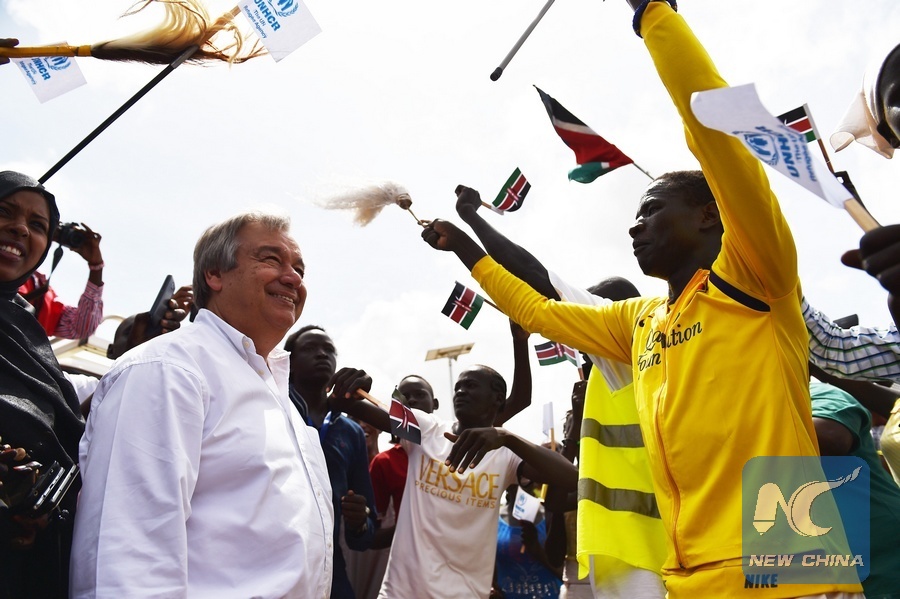File photo taken on May 8, 2015 shows that then UN High Commissioner for Refugees Antonio Guterres (2nd L) is welcomed by Somali refugees at the Dadaab refugee camp in Kenya.(Xinhua/Sun Ruibo)
NAIROBI, Feb. 10 (Xinhua) -- Thousands of refugees who have settled in temporary camps located in Kenya's northern frontier districts are an asset rather than a burden to the local economy, says the World Bank in a new report launched in Nairobi.
According to the report "Economics of Refugees and their Social Dynamics in Kakuma, Kenya," the east African nation could reap enormous benefits through integration of foreign refugees into the local economy and cultural setups.
Apurva Sanghi, World Bank Lead Economist and co-author of the report, urged the authorities to harness the skills and talents of refugees from neighboring countries to foster economic growth, stability and peace.
"Refugees presence in Kenya has been a boon to the macro-economy as evidenced by higher demand for goods and services and provision of skilled labor," Sanghi said.
The World Bank and UN High Commission for Refugees (UNHCR) collaborated in the study to ascertain the contribution of displaced persons from neighboring countries to Kenya's economy.
Kenya is the second largest refugee hosting country in Africa after Ethiopia with government statistics indicating the country is home to an estimated 700,000 refugees from strife-torn neighboring states.
World Bank researchers noted the presence of Kenya's second largest refugee camp Kakuma had a positive impact on key economic sectors like agriculture, fisheries and retail in the Turkana County where it is located.
Their conclusions revealed the presence of refugees in the expansive and semi-arid Turkana County boosted overall income and job creation by 3.4 percent and 3 percent respectively.
In addition, the refugees increased consumption of local staples and dairy products by 35 percent hence expanding the revenue base for smallholder farmers and herders.
Sanghi noted that livestock keepers, farmers and retailers in Turkana County were the greatest beneficiaries of the presence of a refugee camp in their locality.
"Other benefits linked to the presence of a refugee camp in Turkana county include better nutritional outcomes for local population," said Sanghi.
He said the government should invest in skills development for refugees to enhance their contribution to the economy and social renewal.
Raouf Mazou, the UNHCR Representative in Kenya said that reintegration of foreign refugees in their host country will catalyze socioeconomic development.
"Government policies should facilitate a transition from emergency support for refugees to their involvement in long-term development of their host country," Mazou said.
He noted that development of social amenities like education and health is key to hasten reintegration of foreign refugees in Kenya.


